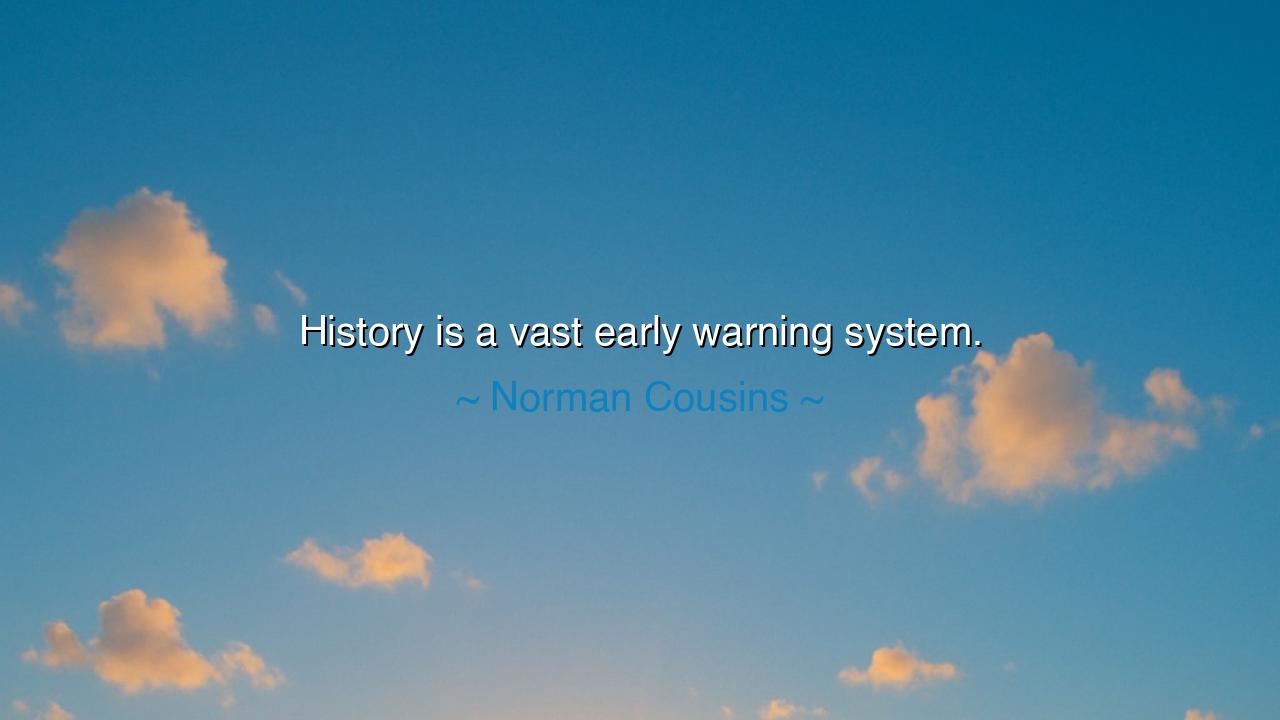
History is a vast early warning system.






"History is a vast early warning system." – Norman Cousins
In this single, piercing sentence, Norman Cousins revealed a truth that echoes across the centuries — that history is not a museum of the dead, but a mirror of the living. When he declared, “History is a vast early warning system,” he reminded humankind that the past is not merely something to be remembered, but something to be read — a sacred text written in the suffering, triumphs, and follies of those who came before us. To ignore it is to blindfold oneself before walking into the fire. To heed it is to carry the light of wisdom into the uncertain corridors of tomorrow.
Cousins was a man of letters and peace, a journalist who lived through the devastations of the twentieth century — world wars, the atomic age, and the Cold War’s shadow of fear. He understood that humanity’s greatest enemy was not violence itself, but forgetfulness. His quote was born from observing how nations, blinded by pride or greed, repeat the same mistakes under new disguises. He saw that every war, every tyranny, every collapse of civilization had been foretold — not by prophets, but by precedent. Thus, he called history an “early warning system,” a vast repository of alarms that ring across the ages for those who are wise enough to listen.
To understand his meaning, one must see that history is not static. It lives, breathes, and repeats its rhythms in those who ignore it. Consider the fall of Rome, a mighty empire undone not by foreign armies, but by its own arrogance and decay — its citizens grew complacent, its leaders corrupt, its wealth concentrated in the few. Centuries later, other empires have risen and fallen in the same pattern, as if Rome’s ruins were not stone but prophecy. Each collapse whispers the same warning: that power without virtue, prosperity without justice, and pride without humility are the heralds of ruin.
Or look to the twentieth century, when humanity’s technological brilliance outpaced its moral maturity. Twice the world was engulfed in war; twice, nations believed their cause was righteous and their might unshakable. Cousins witnessed the nuclear bomb, that monstrous child of science without conscience. He saw in it the same hubris that had undone kings and conquerors throughout the ages — the belief that man could master destruction without destroying himself. History had already warned of such madness, but its voice was drowned in the thunder of ambition.
To say that history is an “early warning system” is to recognize that its purpose is not nostalgia, but guidance. Each chapter of history is a signal flare — some bright, some faint — warning us where arrogance leads, where division festers, where silence in the face of injustice becomes complicity. The wise study these signs not to mourn the past, but to arm the future with understanding. The unwise, however, dismiss history as irrelevant, only to find themselves living its tragedies anew, under different flags and names.
The ancients revered memory as sacred. The Greeks called Mnemosyne — Memory — the mother of all the Muses, for they knew that without remembrance, there can be no creation, no art, no truth. In every civilization, the elders told stories not merely to entertain, but to warn — to place in the minds of the young the wisdom bought by their ancestors’ pain. Cousins, standing in the modern age, echoed that ancient tradition. His words are not a scholarly observation; they are a cry — a plea for humanity to awaken to its own reflection before the same cycles of folly consume it once more.
So, my child of the future, remember this: the past is never past. It lives in you, in your choices, in the patterns of the world around you. Study it not as a record, but as a compass. Learn the causes of injustice, the seeds of conflict, the fragility of peace. Let every act of remembrance sharpen your sight, so you may recognize when history’s warnings rise again — disguised as new temptations, new ambitions, new lies. For those who ignore the echoes of yesterday are destined to relive its storms, but those who listen may yet chart a wiser course.
Heed Cousins’s wisdom, and carry it as a lantern through the darkness: history does not punish — it instructs. It offers its warnings freely, written in the blood and brilliance of those who lived before. The question is not whether the alarms sound — they always do. The question is whether we, the inheritors of time, will have the courage and humility to listen.






AAdministratorAdministrator
Welcome, honored guests. Please leave a comment, we will respond soon